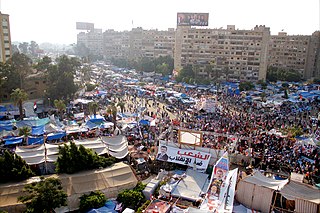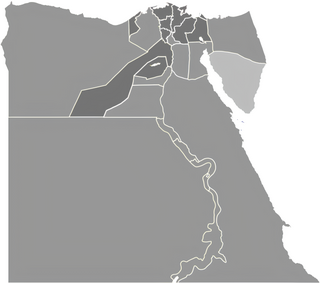Related Research Articles

The president of the Arab Republic of Egypt is the executive head of state of Egypt and the de facto appointer of the official head of government under the Egyptian Constitution of 2014. Under the various iterations of the Constitution of Egypt following the Egyptian Revolution of 1952, the president is also the supreme commander of the Armed Forces, and head of the executive branch of the Egyptian government.
The Muslim Brotherhood is an Islamic organization that was founded in Ismailia, Egypt by Hassan al-Banna in March 1928 as an Islamist religious, political, and social movement. The group spread to other Muslim countries but has its largest, or one of its largest, organizations in Egypt, where for many years it has been the largest, best-organized, and most disciplined political opposition force, despite a succession of government crackdowns in 1948, 1954, 1965 after plots, or alleged plots, of assassination and overthrow were uncovered. Following the 2011 Revolution the group was legalized, and in April 2011 it launched a civic political party called the Freedom and Justice Party (Egypt) to contest elections, including the 2012 presidential election when its candidate Mohamed Morsi became Egypt's first democratically elected president. One year later, however, following massive demonstrations, Morsi was overthrown by the military and arrested. As of 2014, the organization has been declared a terrorist group by Russia, Egypt, UAE, Saudi Arabia and is once again suffering a severe crackdown.

Air Marshal Ahmed Mohamed Shafik Zaki is an Egyptian politician and former presidential candidate. He was a senior commander in the Egyptian Air Force and later served as Prime Minister of Egypt from 29 January 2011 to 3 March 2011 under Hosni Mubarak.

Presidential elections were held in Egypt in 2012, with the first round on 23 and 24 May 2012 and the second on 16 and 17 June. They were the first democratic presidential elections in Egyptian history. The Muslim Brotherhood declared early 18 June 2012, that its candidate, Mohamed Morsi, won Egypt's presidential election, which would be the first victory of an Islamist as head of state in the Arab world. It was the second presidential election in Egypt's history with more than one candidate, following the 2005 election, and the first presidential election after the 2011 Egyptian revolution which ousted president Hosni Mubarak, during the Arab Spring. However, Morsi's presidency was brief and short-lived. He later faced massive protests for and against his rule, only to be ousted in a military coup in July that year.

The Egyptian Crisis was a period that started with the Egyptian revolution of 2011 and ended with the beginning of the presidency of Abdel Fattah el-Sisi in 2014. It was a tumultuous three years of political and social unrest, characterized by mass protests, a series of popular elections, deadly clashes, and military reinforcement. The events have had a lasting effect on the country's current course, its political system and its society.
Hamdeen Sabahi is an Egyptian politician and journalist. He is a former presidential candidate and currently the leader of the Egyptian Popular Current and a co-leader of the National Salvation Front.
The al‑Nour Party, or "Party of The Light", was one of the political parties created in Egypt after the 2011 Egyptian Revolution. It has an ultra-conservative, Islamist ideology, which believes in implementing strict Sharia law. It has been described as the political arm of the Salafi Call Society, and "by far the most prominent" of the several new Salafi parties in Egypt, which it has surpassed by virtue of its "long organizational and administrative experience" and "charismatic leaders". Its political aim is to establish a theocratic state on the lines of Wahhabism like in Saudi Arabia. Saudi Arabia was found to be the main financer of the party according to the public German television news service ARD.

Mohamed Mohamed Morsi Eissa Al-Ayyat was an Egyptian politician, engineer, and professor who was the fifth president of Egypt, from 2012 to 2013, when General Abdel Fattah el-Sisi removed him from office in a coup d'état after protests in June. An Islamist affiliated with the Muslim Brotherhood organization, Morsi led the Freedom and Justice Party from 2011 to 2012.

Mohammed Khairat Saad el-Shater is an Egyptian engineer, businessman and Islamist political activist. A leading member of the Muslim Brotherhood, as the Deputy Supreme Guide, el-Shater was the initial candidate of the movement's Freedom and Justice Party during the 2012 Egyptian presidential election before being disqualified by the election commission. Previously, he was the deputy chairman of the Brotherhood.
Following the 2011 Egyptian revolution, the Muslim Brotherhood in Egypt became one of the main forces contending for political power in Egypt against the Supreme Council of the Armed Forces (SCAF) and other established centers of the former Hosni Mubarak regime.

The Constitution Party is a political party in Egypt. Founded by Nobel Peace Prize laureate Mohammad ElBaradei in 2012, it aims to protect and promote the principles and objectives of the 2011 Egyptian revolution, according to liberal ideals.

The 2012–2013 Egyptian protests were part of the crisis in Egypt including the June 2013 protests, the July 2013 coup d'état, and part of the post-coup unrest. They saw varying opposition against three contiguous heads of state; namely, the Supreme Council of the Armed Forces (SCAF), Muslim Brotherhood, and the de facto ruling Egyptian Armed Forces.

Hazem El Beblawi is an Egyptian economist and politician who was interim prime minister of Egypt from 2013 until 1 March 2014. Previously he served as deputy prime minister and minister of finance in 2011. After the ouster of President Mohammed Morsi and his government in July 2013, Beblawi was named interim prime minister. On 24 February 2014, Beblawi announced his resignation.

The 2013 Egyptian coup d'etat or The Counter-revolution is an event that took place on 3 July 2013. Egyptian army chief General Abdel Fattah el-Sisi led a coalition to remove the democratically elected President of Egypt Mohamed Morsi from power and suspended the Egyptian constitution of 2012. The move came after the military's ultimatum for the government to "resolve its differences" with protesters during widespread national protests. The military arrested Morsi and Muslim Brotherhood leaders, and declared Chief Justice of the Supreme Constitutional Court Adly Mansour as the interim president of Egypt. The announcement was followed by demonstrations and clashes between supporters and opponents of the move throughout Egypt.

Presidential elections were held in Egypt between 26 and 28 May 2014. There were only two candidates, former Egyptian defence minister Abdel Fattah el-Sisi and Egyptian Popular Current candidate Hamdeen Sabahi. El-Sisi won the election in a landslide victory, having received 97% of votes.

Protests against the 2013 Egyptian coup d'état erupted in July 2013. Immediately following the removal of President Mohamed Morsi by the Egyptian Armed Forces on 3 July 2013 amid demonstrations against Morsi's rule, many protesters amassed near the Rabia Al-Adawiya Mosque to call for Morsi's return to power and condemn the military, while others demonstrated in support of the military and interim government. Deadly clashes such as Rabaa massacre continued for several days, with three particularly bloody incidents being described by officials as "massacres" perpetrated by security forces. During the month of Ramadan, prime minister Hazem al-Beblawy threatened to disperse the ongoing Pro-Morsi sit-ins in Rabaa al-Adaweya square and al-Nahda square. The government crackdown of these protests occurred in a violent dispersal on 14 August 2013. In mid-August, the violence directed by the army towards the protesters escalated, with hundreds killed, and the government declaring a month-long nighttime curfew.
Mahmoud Badr is an Egyptian activist and journalist. He co-founded the Tamarod ("Rebel") movement and serves as its official spokesman and one of its principal leaders. Tamarod claimed to have gathered millions of signatures, that were never independently verified, demanding the resignation of Egyptian president Mohamed Morsi, and organized mass protests which preceded the 2013 Egyptian coup d'état removing Morsi from power. Recent audio tapes secretly recorded in the offices of the deputy ministers to Al-Sisi – and authenticated by independent expert analysis from France – establish the movement as an arm of the military coup. Senior officials of the coup are heard on the tapes bragging about how good they were at falsifying evidence against Morsi, at forgery and at torture. The list of plotters included Deputy Defense Minister Mamdouh Shaheen and Gen. Abbas Kamel, the chief of staff to Gen. Abdel Fattah el-Sisi, the top military commander regarded as the mastermind behind the coup.

The Freedom and Justice Party is an Egyptian Islamist political party. The ex-president of the party, Mohamed Morsi, won the 2012 presidential election, and in the 2011 parliamentary election it won more seats than any other party. It is nominally independent, but has strong links to the Muslim Brotherhood of Egypt, the largest political group in Egypt. The party was banned and dissolved in 2014; however, it continues to function underground.
References
- ↑ "Presidential Advisers to Start Work from Headquarters Monday", Egypt Independent , 15 September 2012. Retrieved 12 January 2013
- ↑ Abd Almohsen, Rehab (2012) "Egypt's presidential candidates pledge to boost science", Nature , 26 April 2012. Retrieved 12 January 2013
- ↑ El Gundy, Zeinab (2012) "Muslims Brotherhood on a quest for a presidential candidate", Ahram Online, 8 March 2012. Retrieved 12 January 2013